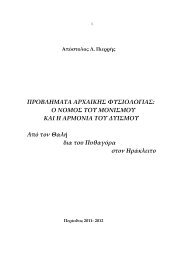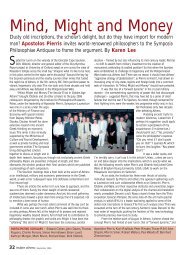4Four reas<strong>on</strong>s are, in aporematic fashi<strong>on</strong>, brought against <strong>the</strong> <strong>the</strong>sis. Allfollow from <strong>the</strong> essential nature <strong>of</strong> παντότης, given an assumpti<strong>on</strong> as to <strong>the</strong> nature <strong>of</strong><strong>the</strong> Absolute first principle which D. in fact denies. I have underlined this assumpti<strong>on</strong>in <strong>the</strong> following formulati<strong>on</strong>s.1) Πάντα include everything; for, that from wh ich nothing is out <strong>of</strong> it, is <strong>the</strong>totality <strong>of</strong> everything subsisting in whichever way , <strong>the</strong> totality <strong>of</strong> all subsistence ἁπλῶς. But if <strong>the</strong> principle was bey<strong>on</strong>d πάντων, since it is something subsisting insome way, <strong>the</strong>n <strong>the</strong> πάντα would miss it, and <strong>the</strong>refore th ey would no l<strong>on</strong>ger beπάντα, c<strong>on</strong>trary to <strong>the</strong> hypo<strong>the</strong>sis. Hence <strong>the</strong> Abs olutely F irst Principle cannot bebey<strong>on</strong>d τῶν πάντων.2) Two moments are included in <strong>the</strong> nature <strong>of</strong> πάντα; two realities arepresupposed by <strong>the</strong> reality <strong>of</strong> πάντα; in still o<strong>the</strong>r words to th e same effect, in orderfor πάντα to be at all, to subsist at all, <strong>the</strong>re must previously be present as asubsistent reality and <strong>the</strong>refore metaphysically available two o<strong>the</strong>r characters: <strong>the</strong>seare <strong>the</strong> πολλότης and <strong>the</strong> πέρας. For πάντα is nothing but πολλὰ πεπερασμένα [5],πολλὰ who have been limited so that to give, as it were, a well-rounded(subParmenidean) whole. The many, indefinite in <strong>the</strong>mselves, are limited by a πέρας,and thus become all that subsists as reality, <strong>the</strong> sum total <strong>of</strong> reality. And so it isessentially involved in παντότης that it is a kind <strong>of</strong> ὅρος, <strong>of</strong> limit, and a certainπερίληψις (a certain “c<strong>on</strong>taining”); hence that which it applies to must be inclusive <strong>of</strong>its limits, both lower (i.e. that which is far<strong>the</strong>st removed from <strong>the</strong> principle), andhigher. But <strong>the</strong> higher limit <strong>of</strong> a totality is <strong>the</strong> principle from which it stems. But thisprinciple is <strong>the</strong> absolutely primal principle; <strong>the</strong>refore <strong>the</strong> Absolutely FirstPrinciple cannot but be included in <strong>the</strong> totality whose first item, <strong>the</strong> beginning [6], i tis.3) There is a certain co-ordinati<strong>on</strong> not <strong>on</strong>ly in <strong>the</strong> orderly system produced bya principle or cause [7] (and every field in which <strong>the</strong> operati<strong>on</strong> <strong>of</strong> <strong>on</strong>e principle takesplace must eo ipso exhibit a certain order), but also between <strong>the</strong> very principle an d<strong>the</strong> causatum. For something <strong>of</strong> <strong>the</strong> nature <strong>of</strong> πρός τι pertains to a principle, a causeor a first ( τὸ πρῶτον), in so far as for something to be a cause it must causesomething else and must bear <strong>the</strong> essential reference to that which it causes; andsimilarly for <strong>the</strong> principle and <strong>the</strong> first. Now wherever <strong>the</strong>re is co-ordinati<strong>on</strong>, <strong>the</strong>reπάντα are to be found, as including all <strong>the</strong> co-ordinated items. But <strong>the</strong> Primal
5Principle is subject to that co-ordinati<strong>on</strong> , and <strong>the</strong>refore it must be c<strong>on</strong>tained in<strong>the</strong> all-inclusive totality.4) Whatever is c<strong>on</strong>ceived in whichever way bel<strong>on</strong>gs to <strong>the</strong> πάντα [8]; but <strong>the</strong>Primal Principle can be c<strong>on</strong>ceived in some way; <strong>the</strong>refore it is included inπάντα.2.7-3.5. Examinati<strong>on</strong> <strong>of</strong> <strong>the</strong> sec<strong>on</strong>d alternative: that <strong>the</strong> First Principle isc<strong>on</strong>tained in πάντα.Arguments against:1) 2.7-16. Everything is ei<strong>the</strong>r a principle or something which subsists invirtue <strong>of</strong> a principle; for <strong>the</strong> divisi<strong>on</strong> ἀρχή - ἀπ᾿ ἀρχῆς is exhaustive. Now if <strong>the</strong> πάνταinclude <strong>the</strong> primal principle <strong>the</strong>y cannot be ἀπ᾿ ἀρχῆς, from a b eginning, from aprinciple in <strong>the</strong>ir totality, qua πάντα. But nor can <strong>the</strong>y be a principle; for what wouldcome out <strong>of</strong> πάντα to set itself beside <strong>the</strong> absolute totality <strong>of</strong> everything? So <strong>the</strong>πάντα can nei<strong>the</strong>r be ἀπ᾿ ἀρχῆς, nor an ἀρχή – which is impossible. Everything elsebeing cogent, we can <strong>on</strong>ly raise <strong>the</strong> impossibility by aband<strong>on</strong>ing <strong>the</strong> hypo<strong>the</strong>sis that<strong>the</strong> Primal Principle is included in πάντα.2.8. The τι must be adverbial, c<strong>on</strong>struing: οὐκ ἂν ἡ ἀρχὴ εἴη τῶν πάντων =<strong>the</strong> ἀρχή in this case would not be a principle <strong>of</strong> πάντα (since it is included in πάντα).But it is tempting to adopt S a ’s reading (testified by R): οὐκ ἂν εἴη τις ἀρχὴ τῶνπάντων.2.15. τοῦτο sc. τὸ τῶν πάντων ἀποτέλεσμα. Meaning: even this would havebeen c<strong>on</strong>tained in πάντα (καὶ τοῦτο γὰρ ἦν ἂν ἐν τοῖς πᾶσιν).2) 2.17-3.5. This part is divided into three unequal subparts. First (a) <strong>the</strong>re is<strong>the</strong> argument against <strong>the</strong> sec<strong>on</strong>d alternative briefly expounded (2.17-18). Then (b)comes a possible rejoinder to <strong>the</strong> argument (2.18-21). And (c) <strong>the</strong> rest is o ccupiedwith an elaborate refutati<strong>on</strong> <strong>of</strong> <strong>the</strong> rejoinder, which necessarily employs some noti<strong>on</strong>sthat will be fully clarified <strong>on</strong>ly later <strong>on</strong>, in <strong>the</strong> appropriate secti<strong>on</strong> <strong>of</strong> <strong>the</strong> work.a) Some multiplicity and distincti<strong>on</strong> is <strong>of</strong> <strong>the</strong> essence <strong>of</strong> πάντα. For παντότηςimplies inclusi<strong>on</strong> into <strong>on</strong>e totality <strong>of</strong> many items distinct am<strong>on</strong>g <strong>the</strong>mselves in someway or o<strong>the</strong>r. Now if <strong>the</strong>re was no principle outside <strong>the</strong> πάντα and prior to <strong>the</strong>m,πάντα would be <strong>the</strong> first given reality, <strong>the</strong> ultimate datum in <strong>the</strong> explanati<strong>on</strong> <strong>of</strong> <strong>the</strong>Universe. But this is impossible [9] (2.18: πῶς οὖν … ἐξεφάνη; with emphasis <strong>on</strong> ε
- Page 2 and 3: 2GENERAL REMARKThe first section is
- Page 6 and 7: 6ὐθύς, i.e. without any prior
- Page 8 and 9: 8ἀμερές). Thus nothing is mi
- Page 10 and 11: 10separate them. Basically, as Aris
- Page 12 and 13: 12produced by, it; the principle in
- Page 14 and 15: 14the fashion of its one-ness, i.e.
- Page 16 and 17: 16[36] it may be. Now the def inite
- Page 18 and 19: 18found, and (there found) in accor
- Page 20 and 21: 20in its elf (apart from the orderi
- Page 22 and 23: 22something whose immediate product
- Page 24 and 25: 24clearer, as the system is further
- Page 26 and 27: 26ἡνωμένον, which generate
- Page 28 and 29: 28We find in this here a good insta
- Page 30 and 31: 30fully see his point, and to take,
- Page 32 and 33: 32NOTES[1] Not quite “given” th
- Page 34 and 35: 34forget that, for the time being,
- Page 36 and 37: 36[28] The interpretation given to
- Page 38 and 39: 38[39] It can be shown that there c
- Page 40 and 41: 40being immersed in it, handling it










